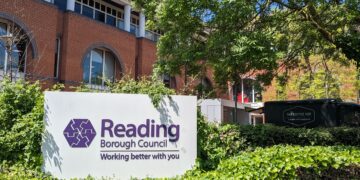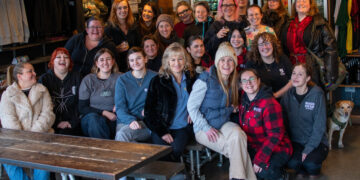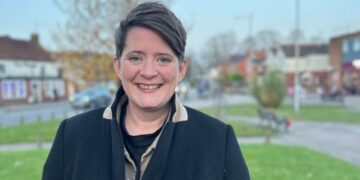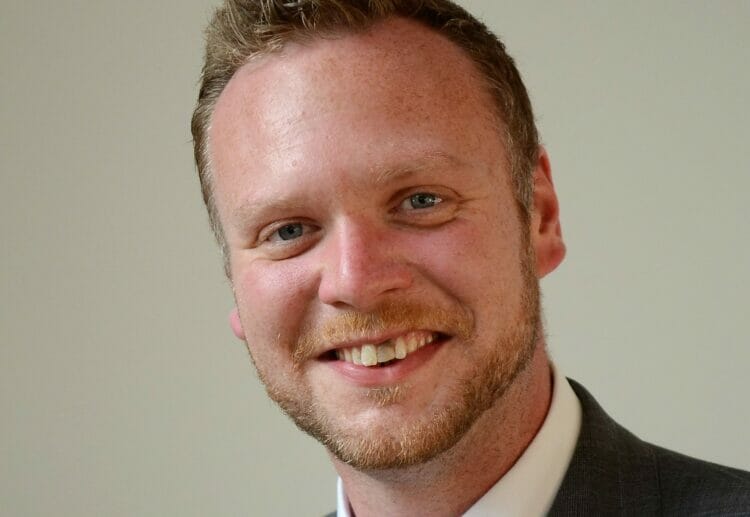THE LEADER of Reading Borough Council, Jason Brock, says he is pleased with the progress Labour has made in running the council over the past 12 months.
At the last local elections, the party picked up two thirds of the available seats – 32 out of 48. This time there are just 17 seats contested. The success of his party doesn’t come a big surprise to Jason.
“I think it’s testament to the fact that we have fantastic community champions standing up around the town. We’re the only party that is active across the entire town, and I’m very humbled the electorate put their faith in so many Labour councillors,” he says.
“It’s a testament to the fact those candidates work really hard, not just in election time but in the build up to it as well.”
Last year, the Green party become Reading’s opposition party. How has Jason found the change?
“I think I’ve often been a bit disappointed that the Greens haven’t been more collaborative,” he says. “The Conservatives, at times, could really make use of the committee system to try and improve things we were proposing for the benefit of people around Reading.
“The Greens have had a much more straightforwardly disengaged attitude. It’s a shame they haven’t made a bit more of their status as official opposition to put us under a sort of proper scrutiny. We all embrace scrutiny in the Labour party, we know it helps make our decisions better. So, it’s been a shame we’ve just had a bit of NIMBYism rather than something a bit more constructive at times.”
This aside, Jason feels the party has achieved much.
“It’s been an eventful and busy year,” he says. “I’m really pleased we’ve managed to drive forward a new tackling inequality strategy with pilot projects across South Reading. I’m really pleased with some of the external funding we’ve been able to bring into the town, particularly the successful levelling up funding bids.”
Add in leisure centres and train stations and yes, there’s been a lot to report on, but Jason is also proud something else.
“The things that really make me smile are some of the small things: Prospect Park playground is phenomenally busy. It is so wonderful to see. Similarly, some of the new council homes that we’ve opened over the past year. To see families moved into these and enjoying a nice life in a stable family home is a tremendous thing.
“So, lots that I’m proud of, but it’s those little things that made me smile the most.”
Jason has mentioned the leisure centres as something to be proud of, but Palmer Park was late in delivery, and Rivermead has also suffered a setback. Green Park station is also not opening on schedule. How is this consistent with his aspiration vision for Reading, as set out in the Labour manifesto?
“The infrastructure running behind is a sad fact of life, but it is a fact of life, especially in the context of all the disruption caused by the pandemic. I am really pleased we’ve been able to continue to make progress on those big projects, but it is shame they’re falling behind. I’m not happy about that.
“I’m impatient for these things to be open as well, but that doesn’t mean our vision is not coherent, cogent, and aspirational for Reading. Look back and you will see, very easily, this is the most ambitious programme of work for a generation: leisure centres, transport, affordable housing, a massive programme of road resurfacing. This is very aspirational, and we’ve made that possible by stewardship of the council’s finances over the past few years to give us a real platform of stability from which we can make those investments in the town and the leverage to bring private investment as well.
“The magnificent projects like Station Hill and reshaping the area around Reading Station is entirely private finance. It’s a wonderful vote of confidence in our town.”
Council finance is an issue. There has been some discontent over the recent council tax rise, at the maximum of 4.99% – something not unique to Reading, but was there another way?
“The choice was increasing council tax by the maximum amount we could or making cuts to frontline services, and cuts to frontline services would affect people up and down the town,” he says. “It seemed right, difficult though it may be, because it allowed us to continue to provide our full range of services.
“This is a failure of government, starving councils across the country. We’ve lost £50 million each year under this Conservative government and that makes a huge difference to the services we can provide.”
The council, Jason adds, has put in additional measures to help support residents who need a hand.
But what about the accounts – late again. Why is this an ongoing problem?
Jason says: “I think it’s sort of a compounding issues. The accounts in 2016-17 were delayed, that had a knock-on effect on all subsequent set of accounts. Having said that, the most recent set of accounts signed off by the auditors got a clean bill of health.”
He adds there is an issue nationally with not enough qualified auditors around, which frustrates him.
“I wish we could sweep through them and get them signed off, but it’s important they do their job properly and look forensically at our accounts. It’s part of that assurance mechanism to know our finances are in the right place, and robust by national standards.
“It requires action from national government to revise the way in which audits work.”
Labour’s manifesto has 90 pledges. Is that too ambitious for the council?
“We think of our manifesto as an iterative process, so every year we tend to tweak, update it, take out pledges achieved and introduce new ones. Ninety pledges may be a lot, but it’s good that we set our sights so high.
“I’d be confident over a four-year period, as we move through the electoral cycle, we’ll be able to deliver against more and more of that.”
The manifesto talks about protecting the borough’s biodiversity, but how can that happen when there is already so much housebuilding?
Jason admits it’s a challenge. “Let’s confront it head on,” he continues. “The obvious case is the old Reading Golf Course. It’s green, there’s a lot of grass, but it’s not a great place of biodiversity. We know we need affordable housing, so it’s good there is a developer who’s come forward with plans for that golf course.
“They’re proposing a very good mix of affordable housing, but also enhancements to biodiversity. Yes, there will be less open green space, but the space there will be publicly accessible and properly biodiverse.
“We are in favour of development, but it has to be the right kind of development to suit the right social outcomes and our very high environmental standards.”
Roadworks remain an issue for many residents, and in recent weeks it’s felt like every road has been affected. Why does nothing seem to be happening to get this sorted?
“I get intensely frustrated with utility companies, I think there’s been a failure from both Conservative and Labour governments on this when they introduced statutory powers which effectively allowed utility companies to come in, dig up the highway, do what they need to do and move on,” he says. “Labour never removed that system and, consequently, we still have this utterly defective way of utility companies undertaking roadworks here in the UK, the sort of thing that no sensible European country would possibly allow.
“It causes disruption for residents in Reading, and in other towns and cities, on a daily basis.
“Our highways team always try and work constructively with utility providers to offer advice, such as this is not a good day do it because it’s, say, Reading Half Marathon. But our powers are far too limited. I will continue to push the government to make urgent reform to those structures. It’s not just disruptive, it’s wasteful.”
On glass recycling from the doorstep, Jason says the council is waiting for confirmation of new government regulations: “We don’t want to invest in all the infrastructure, only to find it’s no longer legally permissible in the way we choose to do it”.
Jason says Labour had a big vision for the future of the town. “We have a sort of generation-defining moment to get a more modal shift in terms of transport, to get people out of cars and on to the bus, their bike, or walking around town,” he says. “We need to encourage that modal shift, not just for the environment, but also because I think we’ll lead a much happier life.
“Around June, July time a new local transport plan for Reading will map out that vision for the borough.
“More fundamentally, I want Reading to be a fairer, greener and cleaner town.
“We are a town that has phenomenal economic success and I want that to be shared around all our communities and neighbourhoods. That’s why tackling inequality is so important.”
He adds: “Only Labour has a record of delivering for Reading right across the town. Our candidates are real community champions and they want to work hard for you.”
























